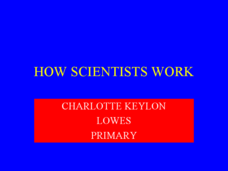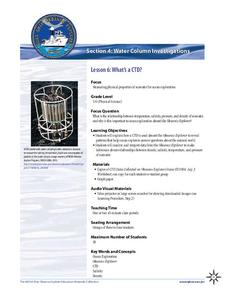Chicago Botanic Garden
Recognizing Change (Observation vs. Inference)
What is the difference between making inferences and making observations? Young climatologists refer to a PowerPoint to make observations on each slide. They record their observations in a provided worksheet before drawing a...
American Physiological Society
Did I Observe it or Infer it?
Take the mystery out of inquiry! When young scientists learn to use their keen powers of observation to make smart inferences about a situation, they are well on their way to understanding what the scientific method is all about. Using...
UAF Geophysical Institute
Observing the Weather
How can you predict the weather without any technology? Young scientists learn to forecast the weather using traditional Native American techniques. Based on their observations of the weather, as well as talking to their classmates, they...
EngageNY
Building Background Knowledge and Making Inferences: What Is a Natural Disaster?
That's a disaster! Scholars complete a gallery walk to view images and make inferences about natural disasters. They fill out a note catcher about what they observe and infer any questions they may have. They then participate in a World...
EngageNY
Making Inferences About Informational Text: Science Talk on How My Insect Contributes to the Rainforest Ecosystem
We need to talk. Learners participate in a science talk by discussing the idea of how insects are important to the rainforest. They record notes about their conversations as they talk. For homework, pupils add to their field journals.
Curated OER
How Scientists Work
The arsenal of tools a scientist uses to observe the world are varied. This great presentation gives students a look at some of the strategies they should use when looking at the world around them. The information can be used as a...
Curated OER
Transparent Shoebox Dig
Take this simulated archaeological dig one layer at a time with your young pupils to encourage observation, critical thinking, and careful attention. Using a transparent box full of layers of sand and artifacts, pupils examine the...
NOAA
What's a CTD?
Why are the properties of the water important when exploring the ocean? Young scientists discover the tools and technology used in deep sea exploration in the fourth installment in a five-part series. Groups work together to examine...
NOAA
Journey to the Unknown
What's it like to be a deep-sea explorer? Tap into the imaginations of your fifth and sixth graders with a vivid lesson, the second part of a six-part adventure. Learners close their eyes and submerge themselves in an expedition aboard...
Curated OER
Follow Those Tracks
Young scholars observe a picture containing patterns of animal tracks, infer what might have happened based upon the pattern of tracks, and write a story describing what might have happened.
Ohio Department of Education
Observe Then Infer
Upper elementary scientists learn that observations made can lead to inferences. They rotate through six weather-related stations that challenge them to make observations and then draw inferences from their observations. A...
Curated OER
Weather Observation Journal
Students record weather for a period of one month. In this weather lesson plan, students observe weather for one month on a large pictograph. Students record clouds, wind, temperature and any other weather conditions they observe....
Curated OER
Science Safety is Elementary
Third graders are introduced to the importance of science safety. As a class, they role play through different safety procedures and decide which senses need to be protected for different scenerios. They discuss how to avoid hazardous...
Curated OER
Fossil Inferences
Fourth graders use their knowledge about fossils to arrange fossil pictures in sequence from oldest to youngest. They explain how fossils can be used to make inferences about past life, climate, geology, and environments and discover...
Curated OER
The Water Cycle
Fifth graders explore the major components of the water cycle. They pay close attention to evaporation, condensation, and precipitation. A water cycle kit is set up in the classroom, which learners observe for a couple of days before the...
Curated OER
What are Igneous Rocks and How are They Formed?
Crystals form before your very eyes! What sixth grader wouldn't enjoy this lesson plan on igneous rock formation? Using hot Salol, junior geologists observe the crystal formation process as the material cools. This comprehensive lesson...
NASA
Radiation Shielding on Spacecraft
Here is a terrific science instructional activity for your elementary schoolers. In it, learners analyze different materials to simulate space radiation shielding on spacecraft, then select the best material to use to build one. This is...
Curated OER
Inference By Analogy
Learners infer the use or meaning of items recovered from a North Carolina Native American site based on 17th-century European settlers' accounts and illustration.
Curated OER
GROWING PLANTS UNIT
Students predict outcomes of scientific experiment,.conduct a scientific experiment with control groups, and plant seeds to observe, measure, and compare growth across groups. They gather, record, analyze, and share data with other...
Curated OER
Sunrise/Sunset
Third graders discovver what causes the dramatic colors of a sunset by seeing the changing color of light as it passes through a clear container of water to which milk is gradually added. They measure the liquids and observe what happens...
Curated OER
The Nitrogen Cycle
The nitrogen cycle is the focus of a well-designed science lesson. In it, learners see that plants and animals produce waste products and decompose after death. Many of the waste products include nitrogen which is absobed by other...
NASA
Let's Investigate Mars
Take your science class on a hypothetical field trip to Mars with an engaging astronomy lesson. After first learning about NASA's Mars rover missions, young scientists plan their own scientific investigations of Earth's nearest neighbor.
Curated OER
Dinosaur Tracks and Critical Thinking
Get your young scientists excited about geology through the study of dinosaur tracks! They will use their power of observation to learn how tracks are made and use critical thinking strategies to suggest a scenario in which they were...
Curated OER
The Carbon Cycle
Here is an interesting science lesson. Pupils discover that carbon, just like water, is absolutely necessary for all living things to survive. They study how it cycles through nature, become familiar with the periodic table, and look at...

























